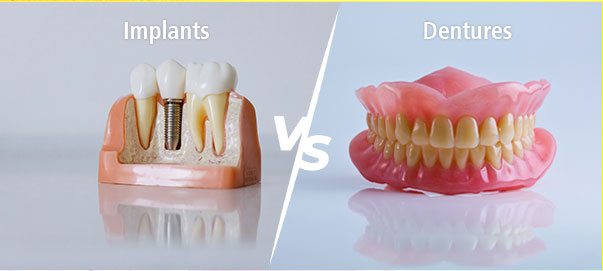
The Battle of Dentures vs Implants: Which Reigns Supreme?
Well, perhaps one of the most critical decisions for a patient who has lost a tooth is choosing between dentures and implants for the replacement of the lost tooth. Both have their merits and demerits. Thus, an important decision is required from the candidate seeking the desired solutions for their lost teeth.
Understanding Dentures
Dentures are those removable prosthetic devices, which have been designed to replace missing teeth, thereby restoring function as well as esthetics in the oral cavity. Of late, there are generally two types: the complete denture and the partial denture. The complete denture is applied when it is designed to replace all the natural teeth remaining in either jaw, whereas a partial denture is used when some of the natural teeth are kept in place.
Benefits of Dentures
- Economical: Dentures are more economical in comparison with dental implants and thus are becoming popular for a financially constrained patient.
- Non-surgical: The fitting procedure of dentures is not surgical. The dentist will take his measurement and make the exact dentures appropriate for the mouth.
- A Quick Fix: Dentures can be fabricated and fitted in a relatively short time period. They are feasible for a patient looking at immediate replacement.
- Adjustment: f the jawbone or gum tissue changes over time, dentures can be adjusted or relined easily.
Deductions of the Dentures
- Stability: The stability of dentures is not absolute; in fact, it may shift or become loose at certain times, especially when eating harder or sticky foods. This causes discomfort and inability to eat and speak properly.
- Bone loss: There is a lack of stimulation to the jaw bone, and consequentially, this is when bone loss can be seen. The facial shape can thus be impacted, and, with time, may have to be adjusted or replaced several times.
What Are Dental Implants?
This procedure surgeons make use of when a metal or titanium post is placed in the jaw bone to act as an artificial root for a dental crown, bridge, or otherwise. It is basically a permanent replacement of a tooth.
Advantages of Dental Implants
- Stability and Functionality: The dental implants are much stable as compared to other restoration alternatives for this tooth since it almost approaches being like natural teeth. It makes patients chew, to speak, to smile, to look beautiful like other persons have with their natural teeth.
- Longevity: Implants are made to last all through one’s lifetime. All that is needed is proper care and maintenance to sustain implants.
- Dental implant retains the jawbone: Dental implants combine with the jawbone, and that makes it stronger that does not collapse. It helps to maintain facial appearance without developing any other mouth condition.
- Oral aesthetics: Dental implants are orally aesthetic compared to natural teeth as they provide an incredible smile and mouth.
Cons of Dental Implants
Dental implants happen to be more expensive comparatively than dentures. This is a surgical procedure, the placement of the implant besides getting the crowns or a bridge.
Getting dental implants can be a very invasive procedure. Oral surgery is involved which may not be suitable for everyone. And thus it requires a lot of healthy jawbone upon which for an implant to sit.
Conclusion
Two options are about a denture and dental implants that have merits and drawbacks. This would be a matter of personal circumstance, oral health, cost, and personal preference. Dental implants are less expensive and are not invasive; however, the aesthetic ability, as well as stability of, is superb. There is always an answer to putting your smile back in place for healthy and functional aesthetics that work for you.
After all, the final result is for you to regain your confidence and enjoy a healthy functioning smile that meets your needs. Ultimately, the choice of what best restores your smile and oral wellness will be left to the dental professional.
Leave a Reply
Leave a Reply
Explore More Similar Posts
Explore More Blogs


Leave a Reply